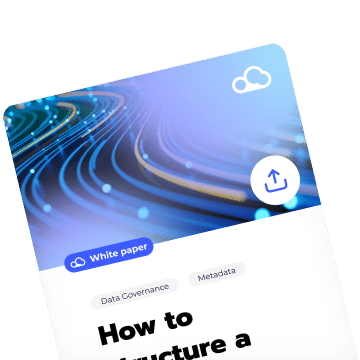A lack of data governance, a major axis of data-driven business transformation, is the cause of many malfunctions and errors during data catalog transformation projects. The modern data governance approach is defined on two inseparable axes: Defining the data cultural maturity of its teams and implementing agile data governance techniques. Without collaboration and a common culture, any project is set to fail.
1. Increase existing data knowledge
Knowledge of your data is critical to the success of any data governance project. First, organizations should start to inventory and increase the knowledge of data assets, to get out of the “Data Swamp” trap. It’s essential to implement well-defined data governance rules and above all, they must be actionable and pragmatic.
2. Develop a strong data culture
Developing the data maturity of your teams is a crucial step in the success of any data governance project. The acculturation of all employees must be carried out to accompany the data-driven transformation of the organization, so that everyone identifies their role, scope, and needs in terms of data. Organizational data culture is built together: It is a collective project that exists through agile iteration and the sharing of practices.
3. Choose the right data governance platform
The ability of an organization to manage and utilize its data effectively can set it apart from its competitors. The foundation of this capability rests on a robust data governance framework. Such a framework ensures that data is consistent, trustworthy, and used effectively across the organization. While most recognize its importance, building and implementing an effective data governance framework can be challenging.
A comprehensive data governance platform must answer the following questions about your data: What is it? Where is it? How is it calculated? Why is it done?
Utilizing a data dictionary
The data dictionary allows teams to make an inventory and give context to data knowledge. Collaborative mapping of data helps reduce misunderstanding and redundancies.
A data dictionary can catalog sources, treatments, and structures to provide teams with a glossary to understand the meaning of the data and trace their uses. The data dictionary lists the complete knowledge of your data, wherever it is stored, in an easy-to-access, simple, and collaborative environment.
Implementing a business glossary
A business glossary is a great way to keep track of your business’ data and share common definitions of the terminologies used in business services. An important knowledge base, the business glossary allows teams to define and maintain the definition of their company’s data. This business glossary has become a common reference that everyone can use to work independently on their subjects. Employees discover, understand, and integrate the specific challenges of the data circulating in their department, right down to the overall organization.
A data catalog for data governance success
A data catalog enables collaboration to describe and specify data processing in a collaborative and agile environment. The treatments and transformation rules applied to the data are stored in the platform, and it is freely accessible by users. The clear advantage of a catalog referencing your processes is that it allows you to trace the path of data, including input to output from the data manipulation chains.
Data catalogs are the ideal tools for identifying and sharing application assets and dashboards. With an information system that is becoming complex, teams are developing new uses on a daily basis, making them more difficult to understand. Data catalogs are also the perfect tools for mastering the knowledge of these uses – Teams have a single repository at their disposal to contextualize the origin of the data. It becomes the essential reference for accessing or analyzing the impact of a change in usage.
How does proper data governance help your data teams?
Data governance won’t just happen in your organization by snapping your fingers – The best way to build a data-driven culture is to engage your people in a long-term, bottom-up approach. Teams have the knowledge of data, and they have the expertise and the ideas to make the most of it.
A self-service search engine
A data catalog search engine is an essential element for an effective data governance solution. All data knowledge is indexed and accessible with a simple click, you search, you find. Whether it’s a data source, a definition, a use, or a treatment, every employee can find the answer to their questions. Therefore, a complete search engine is critical to any data governance strategy.
Data lineage
Data lineage tracking is important for analyzing the path of the data from end to end. Data lineage tools enable users to control the risks associated with usage by providing access to the appropriate lines to locate and trace the transformation path of data or use.
Conclusion
Without collaboration and agility, data governance will be painfully difficult or will not happen. Deploying a collaborative platform for data governance is a challenge that needs to be addressed – It’s a process that takes time, investment, and commitment from everyone. However, all users can benefit from utilizing the platform.
—
Do you still have questions about achieving data governance? Turn to DataGalaxy to create your company’s data lineage mapping, develop a standardized business glossary, and much more! Check our calendar and select a date that works for you to jumpstart your free 15-day platform trial access & start making the most of your data today!





